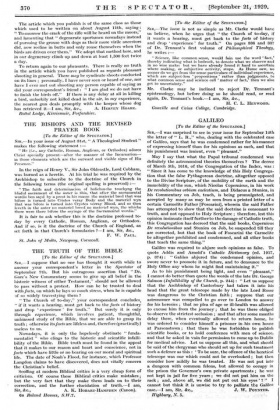GALILEO [To the Editor of the SPECTATOR.] SIR,—I was surprised
to see in your issue for September 14th the letter of " L. R.," who, dealing with the celebrated case of Galileo, says that he was condemned rather for his manner of expressing himself than for his opinions as such, and that his punishment was lenient, even " pleasant."
May I say that what the Papal tribunal condemned was definitely the astronomical theories themselves ? The decree of March 5th, 1616, of the Congregation of the Index, was : " Since it has come to the knowledge of this Holy Congrega-
tion that the false Pythagorean doctrine, altogether opposed to the Divine Scripture, of the mobility of the earth and the immobility of the sun, which Nicolas Copernicus, in his work De revolutionibus orbium caelestium, and Didacus a Stunica, in his Commentary on Job, teach, is being promulgated, and
accepted by many as may be seen from a printed letter of a certain Carmelite Father [Foscarini], wherein the said Father
has attempted to show that the said doctrine is consonant to truth, and not opposed to Holy Scripture ; therefore, lest this opinion insinuate itself further to the damage of Catholic truth, this Congregation has decreed that the said books, Copernicus De revolutionibus and Stunica on Job, be suspended till they are corrected, but that the book of Foscarini the Carmelite
be altogether prohibited and condemned, and all other books that teach the same thing."
Galileo was required to abjure such opinions as false. To
quote Addis and Arnold's Catholic Dictionary (ed. 1917, p. 374) : " Galileo abjured the condemned opinion, and swore never to promote it in future, and to denounce to the Holy Office any whom he might find maintaining it."
As to his punishment being light, and even " pleasant," I cannot do better than quote the words of the late Dr. George Salmon (Infallibility of the Church, p. 244) : " Let us suppose that the Archbishop of Canterbury had taken it into his
head that the great telescope made by the late Lord Rosse was dangerous to the Christian faith ; suppose that our astronomer was compelled to go over to' London to answer for his heresies ; that no plea of age or ill-health was allowed to excuse him from the journey ; that he was there obliged to observe the strictest seclusion ; and that after some months delay there, when eventually allowed to return home, he was ordered to consider himself a prisoner in. his own house at Parsonstown ; that there he was forbidden to publish scientific books, or to hold conference with men of science, and that he asked in vain for permission to come up to Dublin for medical advice. Let us suppose all this, and what should be said of the clergyman who should set up for such treatment such a defence as this : ' To be sure, the offence of the heretical
telescope was one which could not be overlooked ; but then
consider how mildly he was treated. He was not put into a dungeon with common felons, but allowed to occupy in the prison the Governor's own private apartments ; he was not kept in jail for five years ; we did not put him on the
rack ; and, above all, we did not put out his eyes ' " cannot but think it is unwise to try to palliate the Galileo Highbury, N. 5.












































 Previous page
Previous page